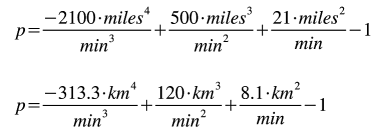Running
I have done it all between 1500 meters and 100 km. But that was 15 years ago, and now I only run to the fridge and back during the commercial brakes in my favourite TV show. Apart from that, I visit once in a while the home page of Runner's World to get some inspiration.
Believe it or not, I took part in the Helsinki City Marathon on August 2nd, 2003. I finished 1857th with a brutto time of 4:10:02 and a netto time of 4:06:50.
I started running some 25 years ago after reading the book Aerobics by Kenneth Cooper. I somehow liked his point system, although I found the tables scientifically not convincing as they contained discontinuities (he probably simplified them to keep the amount of math manageable for the average user). Based on his tables, I created this formula to calculate the number of points you earn by running a certain distance at a certain time. The formula in the image below is not applicable for very slow and very fast runners (neither are Kenneth Cooper's tables), but it works for me and doesn't contain discontinuities. The top formula uses miles, and the lower one is for those who understand the metric system.
Almost 50 years ago, Toni Nett published in his book Der Lauf (Berlin. Verlag Bartels und Wernitz, 1960) thumb rules to calculate possible personal records for common distances. The possible personal bests are calculated based on known performances on the next shorter distance. Manfred Steffny extended Toni Nett's rules to cover the marathon and the 100 km. He found these rules surprisingly accurate when comparing the personal bests of hundreds of runners of different levels, from beginner to world champion. Here is the list of these thumb rules as given in Manfred Steffny's book Marathontraining (Mainz, Verlag Dr. Hanns Krach, 1984, 5. ed.):
1500 m = 800 m x 2
3000 m = 1500 m x 2 + 20 sec
5000 m = ((3000 m + 20 sec) x 5)/3
10000 m = 5000 m x 2 + 1 min
marathon = 10000 m x 5 - 10 min
100 km = marathon x 3 (for each minute the marathon time is faster than 3 hours, you should subtract one minute from the final 100 km time).
The old online running calculator (link to the archived version on the wayback machine) from the McMillan Running pages was based on a similar numerical approach but probably gave slightly too fast estimates of possible marathon times for slower runners. And the longest distance this calculator covered was the marathon.




